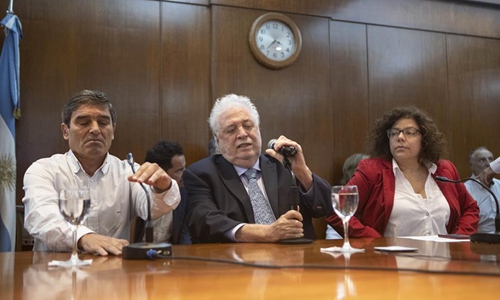HOME >> WORLD
COVID-19 cases continue to rise in LatAm, measures taken to prevent spread
Source:Xinhua Published: 2020/3/11 13:10:31

Argentinean Health Minister Gines Gonzalez Garcia (C) attends a press conference in Buenos Aires, Argentina, on March 3, 2020. Argentinean authorities on Tuesday confirmed the country's first case of the new coronavirus (COVID-19). (Photo by Martin Zabala/Xinhua)
COVID-19 cases continue to climb up in Latin America, with the region's biggest country, Brazil, reporting Tuesday that its number of confirmed cases rose from 25 to 34.
Of the nine new cases, seven involved people who contracted the disease while traveling abroad and two were locally infected due to contact with previous patients, Brazilian health authorities said.
The authorities also said that there are 893 suspected cases, and 780 others tested negative and were discharged in the country.
In the first measure of its kind, a judge in Brazil's capital city of Brasilia ordered the husband of a confirmed coronavirus patient to undergo testing for the disease after he refused.
Judge Raquel Barbosa also ordered the man, a 45-year-old lawyer, to self-quarantine at home until the test results come out. If he fails to comply, he can be fined the equivalent of 1,075 US dollars.
The case was referred to the judge by the Federal District's Health Secretariat, which said the man reported having symptoms, but declined to be tested.
Brazilians need to modify certain habits, such as shaking hands, to prevent the spread of COVID-19 and other contagious diseases, a health expert said on Tuesday.
"It's not bad to shake hands, but if I have an infection, I will not shake your hand, I will tell you that I have an infection," said Edimilson Migowski, the president of the Instituto Vital Brazil which is a laboratory run by the state of Rio de Janeiro to produce medications.
In Chile, its Health Ministry said four new patients were identified in the past 24 hours, bringing the total to 17 in the country.
"We continue to be in Phase 2, that is when cases are imported or spread within the country by the imported cases," the Health Ministry's undersecretary of assistance networks, Arturo Zuniga, said at a press conference.
Chilean Health Minister Jaime Manalich said anyone arriving from Spain and Italy, the two European countries with high rates of infection, must remain in quarantine at home for up to two weeks to determine whether they have the virus or not.
"They will be given medical leave if needed" to be absent from work without being penalized by employers, Manalich told reporters.
Costa Rica said its number of cases has reached 13 after four more cases were detected, including two kids and two adult males. The new cases are linked to a prior patient currently in the hospital.
In Peru, officials confirmed two new cases, raising the total to 11 in the country. Health Minister Elizabeth Hinostroza said the new patients are two brothers from the central Huanuco region who recently returned from a trip to Europe.
Paraguay's Health Ministry reported its second confirmed case of the coronavirus: an elderly patient, 83, who recently arrived from Argentina.
Meanwhile, the Argentine government announced it was earmarking 1.7 billion pesos (27 million US dollars) to better combat the coronavirus, which has so far infected 17 people and led to one death in the country.
The money will be spent on upgrading laboratory and hospital equipment.
Posted in: AMERICAS,WORLD FOCUS